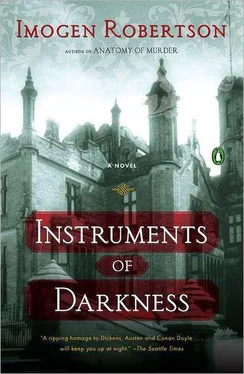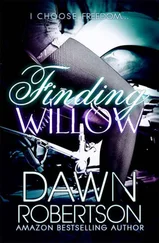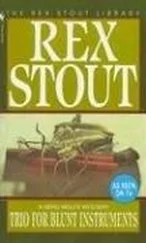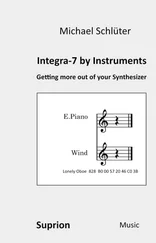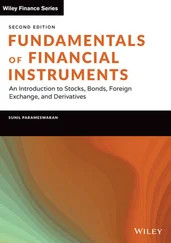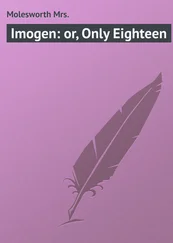Imogen Robertson - Instruments of Darkness
Здесь есть возможность читать онлайн «Imogen Robertson - Instruments of Darkness» весь текст электронной книги совершенно бесплатно (целиком полную версию без сокращений). В некоторых случаях можно слушать аудио, скачать через торрент в формате fb2 и присутствует краткое содержание. Год выпуска: 2011, Издательство: PENGUIN group, Жанр: Исторический детектив, на английском языке. Описание произведения, (предисловие) а так же отзывы посетителей доступны на портале библиотеки ЛибКат.
- Название:Instruments of Darkness
- Автор:
- Издательство:PENGUIN group
- Жанр:
- Год:2011
- ISBN:нет данных
- Рейтинг книги:5 / 5. Голосов: 1
-
Избранное:Добавить в избранное
- Отзывы:
-
Ваша оценка:
- 100
- 1
- 2
- 3
- 4
- 5
Instruments of Darkness: краткое содержание, описание и аннотация
Предлагаем к чтению аннотацию, описание, краткое содержание или предисловие (зависит от того, что написал сам автор книги «Instruments of Darkness»). Если вы не нашли необходимую информацию о книге — напишите в комментариях, мы постараемся отыскать её.
Instruments of Darkness — читать онлайн бесплатно полную книгу (весь текст) целиком
Ниже представлен текст книги, разбитый по страницам. Система сохранения места последней прочитанной страницы, позволяет с удобством читать онлайн бесплатно книгу «Instruments of Darkness», без необходимости каждый раз заново искать на чём Вы остановились. Поставьте закладку, и сможете в любой момент перейти на страницу, на которой закончили чтение.
Интервал:
Закладка:
As she replied she tapped her riding crop against her dress.
She did not take her eyes from the body, and her tone was that of private contemplation.
“He is a stranger. I think if he were from Thornleigh or the village I would know him, but … How old do you think this man, and of what condition in life?”
“I would put him between thirty-five and forty-five. About his condition-I would say he is not poor. He has a coat and cloak, and his hands are clean enough, and unscarred. You can see that yourself. What is it you know, Mrs. Westerman, that I do not?”
“Nothing. Merely local history. And the history says the eldest son of Lord Thornleigh left the protection of his family some fifteen years ago, and would be now of this age. His name was Alexander, Viscount Hardew. He is a blond-haired man in the portrait I have seen.”
She took a pace away from the body and turned to look up the path toward the Thornleigh lands. A breeze murmured through the trees and tugged gently at the edge of Crowther’s coat, as if trying to take him back to his rooms and his books before any more was spoken, before some line was crossed.
“You see, sir,” she went on, “I cannot help wondering if this poor man is the heir to the great estates of my neighbors, and if so, why he received so cold a welcome home.”
3
As Susan practiced in the shop the morning after the concert, she wondered if she had been a little too quick to turn down the maid and carriage that her father had offered her the night before. The heat was oppressive: she could feel the sweat gathering under her arms and on the back of her neck, and in London heat brought the stench of the city all through the house. It might have been pleasant to drive around the park with a pony and a pretty dress on instead of going through her exercises here in the shop, with the scores and parts of music her father printed and sold piled around her.
Normally the room stayed cool even in the summer, for it was a long and elegant space with nothing to disturb it but her own harpsichord, the counter running along one wall and some small displays of the latest airs and themes arranged on tabletops below the windows, but already this year the air felt hot in her chest. These exercises her body knew almost better than her mind. She could watch her fingers on the keys and hear the pluck and thrum of the instrument as if she watched from outside her own body. It left her free to think while appearing busy, so she let her mind wander through the city outside.
She had seen carriages enough stopping at the shop, and the ladies who tended to get out of them. She had not seen anyone of her own age in them, though. The ladies in carriages tended to have maids with them or more ladies, never young girls. They were all very beautiful, but all seemed to look rather tired as if wearing those heavy dresses was a great deal of work. She remembered a lady who had come in when she was at her instrument once, and who had wanted her to play at a party for her friends. She had called her a little Mozart and had gone into raptures. That is what she had said. “I’m in raptures!” Her dress made a great deal of noise, and she had red stuff on her mouth. She had put her face right up to Susan’s and declared her “such a pretty thing.”
Susan had not liked it. And her father neither. He had been relatively firm with the lady, and she had not come back. He had told Susan that if she met “that woman” on the street she was on no account to go anywhere with her. Susan wondered if she was a Cyprian. She knew about such women from the talk in the square: they let men kiss them and do other things for money, but as she thought it was something her father would not want her to know, she had not questioned him. There were other ladies who smiled at her without coming so close, and her father often asked her to play through some of the music they sold so the ladies could say if they liked it and take it away to learn. They did all seem only half-alive to her, though. She thought how horrible it must be to walk around so slowly all the time. She found her fingers were playing the next variation all by themselves.
“We all need time to think, Susan,” her father said, smiling over his ledger at the counter. “But I know perfectly well you have not been concentrating at all in the last little while. If you wish to stop, you may. Otherwise, never forget you are in search of the music under the mechanics.”
Susan looked up. Her father was pushing a thread of his yellow hair out of his eyes. She grinned and sheepishly turned back to the keyboard, trying to remember the music, the cut and run of counterpoint growing under her hand. Alexander was a lover of music. The backyard of their house contained the brute force of his enterprise, the place where the copper plates were kept on which he carved other men’s notes, the presses that fixed them, and he had passed on the love and the craft to his daughter. Yet, at times when the metal smelled hot and bitter and her hands were reluctant and weak on the keys, music could seem a tyrant and a bully. It mocked her, being always a little beyond what she could do, what she could know. She had seen her papa often enough late and tired sorting through his accounts to suspect he felt the same. Yet music was mother to her now, and her father’s beloved. Her nine years had been spent smothered in music, fed by it. She could not imagine any other way of life.
A gentleman came in through the door, bowed slightly to them both, then turned to browse through the open scores on the countertop. Susan looked at him again. Perhaps not a gentleman after all. When her father turned back to his books, the man covertly studied him with a narrowed, calculating look. Her fingers tripped, and he noticed and glanced around at her. His skin was rather yellow. He smiled-and she saw that his front teeth were missing. Just then, the bell rang again, and a woman in a skirt wide enough for three ladies swept in with a loud greeting and offered Alexander her hand. The yellow man slipped away before the door had time to close again. Susan shivered. The feeling of oppression the man had brought into the room lasted with her for much of the rest of the morning, and whatever her efforts, her practices were wasted.
4
Mrs. Westerman’s home, Caveley Park, was acknowledged to be a well-run, handsome estate, flourishing under the care of its new owners. True, it had none of the pretensions to greatness of its nearest neighbor, Thornleigh Hall, but Commodore Westerman was a talented and, still better, a lucky commander of some seniority, and it showed in the size of the purchase, and the care with which the refitting of the house and investment in the estate had been carried out. His wife had acquired a reputation as a capable manager of his interests, and her arrangements were approved of, and often copied, by others in the area.
Harriet Westerman had not intended to remain ashore when the purchase was first discussed, but a number of circumstances had rendered her presence on the estate both practical and necessary while her husband continued abroad, first in the Channel and since the new year serving his sovereign by cruising the West Indies. She had therefore given up life aboard ship, or at some far-flung naval base, dining sometimes with potentates and kings, sometimes with fishermen and the threadbare officers of the more uncomfortable postings around her country’s growing empire, and taken on instead the more settled life of a country gentlewoman.
The first of these circumstances was the realization that an estate of this size would need more close attention than the irregular and unreliable communications from a ship of His Majesty’s Navy might allow. The second was the birth of her son Stephen, who, though now he seemed to be thriving and strong, had been a weak, sickly sort of baby-reluctant to grow fat in sea air. He had been born afloat on his father’s ship as she labored against unseasonable winds home from a posting in the East Indies. The Westermans had already lost one child in the previous year, and the grief of that little boy’s loss was a small burning place between them. He had been born and died on the far side of the world, and lived long enough only to be named. His little body was laid in the ground of the East India Company’s church in Calcutta. Harriet still sometimes saw that little patch of foreign soil under her feet even as she walked her paths of English lavender. She spoke of that time rarely even with her sister. The Westermans would do all they could to avoid such another grief. The question of the little boy’s remaining on land with some respectable family had been touched upon, but Commodore Westerman put the case forcefully for the advantages of a mother’s care.
Читать дальшеИнтервал:
Закладка:
Похожие книги на «Instruments of Darkness»
Представляем Вашему вниманию похожие книги на «Instruments of Darkness» списком для выбора. Мы отобрали схожую по названию и смыслу литературу в надежде предоставить читателям больше вариантов отыскать новые, интересные, ещё непрочитанные произведения.
Обсуждение, отзывы о книге «Instruments of Darkness» и просто собственные мнения читателей. Оставьте ваши комментарии, напишите, что Вы думаете о произведении, его смысле или главных героях. Укажите что конкретно понравилось, а что нет, и почему Вы так считаете.
